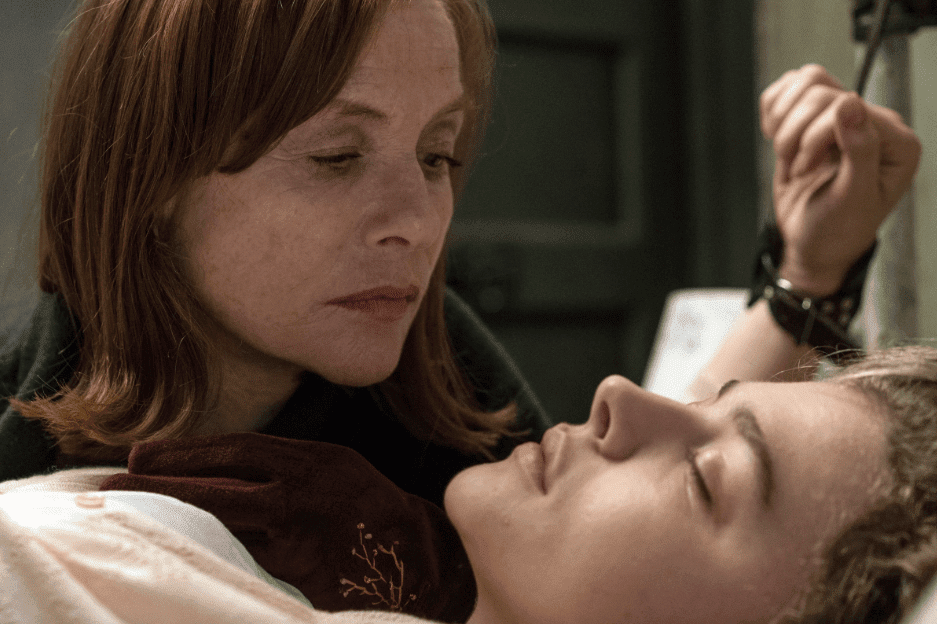
For the first quarter of Greta, the latest thriller from Neil Jordan (Interview with a Vampire, The Crying Game), I kept looking for some sort of subtext. Surely, this Oscar winning writer/director was trying to explore some deeper theme. Maybe he was offering a twisted take on mother/daughter relationships? Or perhaps he’s trying to comment on how much we rely on modern technology? But there wasn’t enough evidence to support either theory. Eventually, I stopped looking for a deeper reading… and then really started enjoying myself.
Greta opens on Frances (Chloe Grace Moretz), a college student from a small town who’s trying to get over the death of her mother while also failing to assimilate into the bustling world of NYC. She’s shy, lonely, and can’t relate to the perceived coldness of the people around her. But things change when she stumbles on a forgotten purse in the subway and decides to track down the owner—the titular Greta, played by French legend, Isabelle Huppert. And a friendship is formed!
At first, their unlikely pairing seems like a great thing for both parties. Frances is able to bond with a maternal figure while Greta, who mentions having an estranged relationship with her daughter, can be a role model and confidant for a young woman. But things take a hard left turn quickly, and the many questions surrounding Greta’s life – as well as the nefarious tactics she uses to keep her friendship with Frances – start to get creepy.
That sharp tonal shift from light-hearted drama to genuinely-unsettling thriller is where the film truly comes together and starts to soar. While the otherwise effective trailer has, unfortunately, spoiled this initial twist, the reveal that the audience is about to watch a horror film makes for great popcorn cinema. Even better: the reveals just get weirder from there. Jordan’s clever screenplay, co-written with Ray Wright, does a commendable job at surprising audiences, even while evoking classic tropes of the genre. We’ve seen these plot devices before, but they are rarely all seen together. This has elements of Single White Female, Wild Things, The Game, Dressed to Kill, and maybe a half-dozen other tawdry thrillers. And Jordan is clearly having a blast playing with the unabashedly trashy conglomeration he’s put together.
The film also greatly benefits from the drought that Hollywood has cursed audiences with when it comes to producing R-rated thrillers. While Greta may not technically be all that original, it really does feel like a breath of fresh air when compared to what else is playing in cinemas right now. In many ways, it feels like something left over from the ’90s—like a film greenlit in the wake of Sleeping with the Enemy‘s box office success. But Jordan modernizes the whole affair by turning messaging apps and iPhones into key plot points – little touches that make the film feel fresh, and adds a jolt of modernity to the suspenseful sequences.
This also marks a career best performance from Moretz, who manages to become an effective audience surrogate and makes them truly empathize with her early heart-ache and, later, her outright terror. While her early work as a child actor was impressive, Moretz seemed to be maturing into a self-conscious and overly-mannered actress. For the first time in a long time, she truly manages to have fun and get totally lost in the film. This might be because of her incredible scene partner; Isabelle Huppert probably could have done this part in her sleep, but she still gives it her all. Greta isn’t a particularly developed villain – she’s never really given any motivation, and she just gets progressively more evil as the film goes on. But Huppert is clearly having a blast, practically begging the audience to fear her, while also making it impossible to look away from what she’s doing onscreen. It’s a terrific camp performance.
As much fun as the film may be, it is hard to deny that one or two sequences fall flat. A bizarre dream sequence feels totally out of place, and one character (played by frequent Jordan collaborator Stephen Rea) exists purely to inflate the otherwise tight runtime. The film’s final plot twist also might prove to be a bit too ridiculous for some viewers. If you fully give yourself over to the B-movie this film clearly wants to be, then the final act might work. If not, it will be a genuinely frustrating gap in logic.
Neil Jordan won an Oscar in 1993 for his fabulous screenplay for The Crying Game. His career has been marked with other Oscar contenders, and even a stuffy cable drama at the start of the Golden Age of Television. But he’s a filmmaker with a clear love of camp and tawdriness. Many of his films have a pulpiness to them and Interview with a Vampire, arguably his most famous film, is basically a homoerotic soap opera. With Greta, it’s nice to see him completely give himself over to his B-movie sensibilities. This is a wild ride, and audiences who watch with the right mindset will have a blast.
Rating: 8/10
Greta opens in theaters nationwide today.

